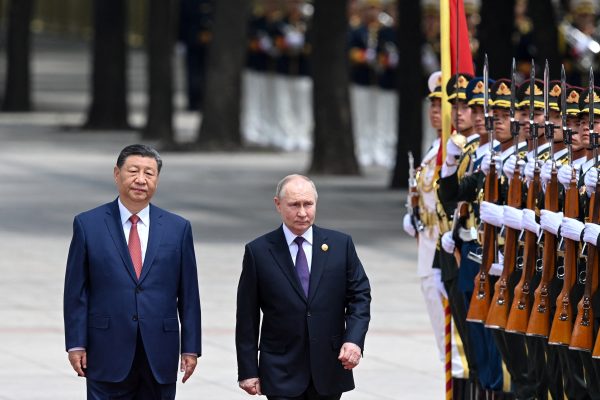In January 2020, presidential candidate Joe Biden warned that “the international system that the United States so carefully constructed is coming apart at the seams.” China was front and center of his argument and references to Russia were tertiary. “We have to champion liberty and democracy, reclaim our credibility,” he wrote.
How do China, North Korea, and Iran assess the US’s current credibility, in light of the West’s two-decade-long retreat from Russia’s predation, and despite promises to protect the “rules-based international order”?
In Geneva in 2021, that order was further undermined by the endorsement of the infamous Minsk Accords, a sheaf of commitments that Russia never kept. Alongside Washington’s 20-year appeasement of Russia’s aggression, it gave a green light to Putin’s full-bore invasion of Ukraine.
Two years later, US deterrence credibility is fast deteriorating. Biden’s political opponents in Congress have blocked aid to Ukraine, for now at least, and some parts of Europe push for a “settlement.”
If Russia is allowed to win recognition for any part of its land grab in Ukraine, it would do huge damage.
Ukraine is not Vietnam, or Afghanistan, or Iraq. It is the largest country in Europe. Its first democratic constitution was drawn up 77 years before the US’s own, and years ahead of Montesquieu’s The Spirit of the Laws.
Its traditions — including an equivalent of the Magna Carta that predates England’s by 200 years — are antipathetic to Russia’s love of the “power vertical”. Little wonder the destruction of Ukraine’s sovereignty has been at the core of Russia’s total warfare doctrine against the West since at least 1997.
Ukraine’s independence in 1991 ensured the collapse of the USSR, allowing the US to declare it had won the Cold War. It ended the hemorrhaging of an estimated $13 trillion during that era and handed the US a global primacy no country had enjoyed since perhaps Britain in the mid-19th century.
And what has the US done with its status? It has squandered it, as it did after World War II, by relying on dozens of “agreements” with Moscow, which cynically pocketed one concession after another.
The West did what the nations of the former Soviet empire warned it not to. It effectively instituted a Marshall Plan for Russia, the perpetrator, championing its membership of the International Monetary Fund, the World Bank, and the G7, while disastrously allowing Russia to inherit the UN Security Council seat belonging to the Soviet Union.
Ukraine played a major role in making America great again through its role in felling the Soviet Union and acting as a staunch ally during the West’s two-decade war on terror.
And yet Ukraine now fights alone against a terrorist state that since the 1970s has curated and financed Islamic terrorism against America and Israel. Meanwhile, it hectored Ukraine to surrender the world’s third-largest nuclear arsenal in exchange for “security assurances.”
The US said at the time it would make Ukraine secure. Vladimir Putin disagreed: If “you cannot count on international law, then you must find other ways to ensure your security,” he wrote in 2013. “Thus, a growing number of countries seek to acquire weapons of mass destruction. This is logical: if you have the bomb, no one will touch you.”
If Ukraine’s territorial and maritime integrity isn’t recovered, China’s self-assurance about Taiwan and the Indo-Pacific region will rocket to a dangerous certainty. What will the cascading effect be on Washington’s global credibility? In the South China Sea? In the Sea of Japan? The Philippines? The Baltic states?
The rules-based international order will be shredded.
Throwing Ukraine under the bus — again — will not save the United States and its allies. Instead, it will tip the world into a sinkhole of global war on multiple fronts.
And future generations will have reason to curse those who allowed this shoddy, short-sighted outcome.
Victor Rud is the past Chairman of the Ukrainian American Bar Association and now chairs its Committee on Foreign Affairs. He is a graduate of Harvard College and Duke University Law School.
Europe’s Edge is CEPA’s online journal covering critical topics on the foreign policy docket across Europe and North America. All opinions are those of the author and do not necessarily represent the position or views of the institutions they represent or the Center for European Policy Analysis.





